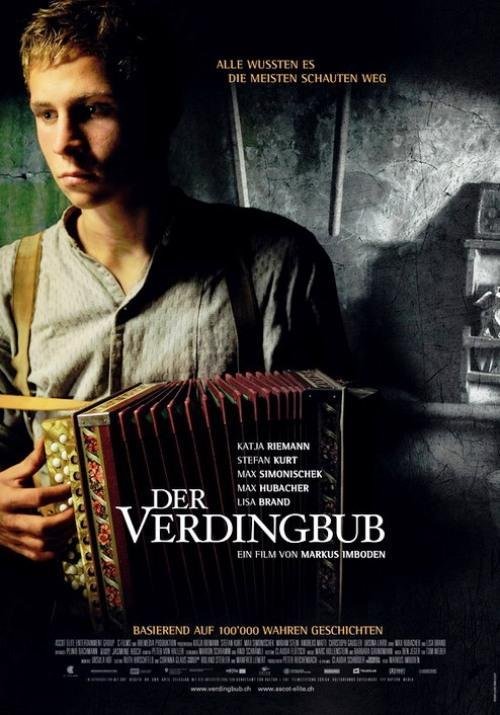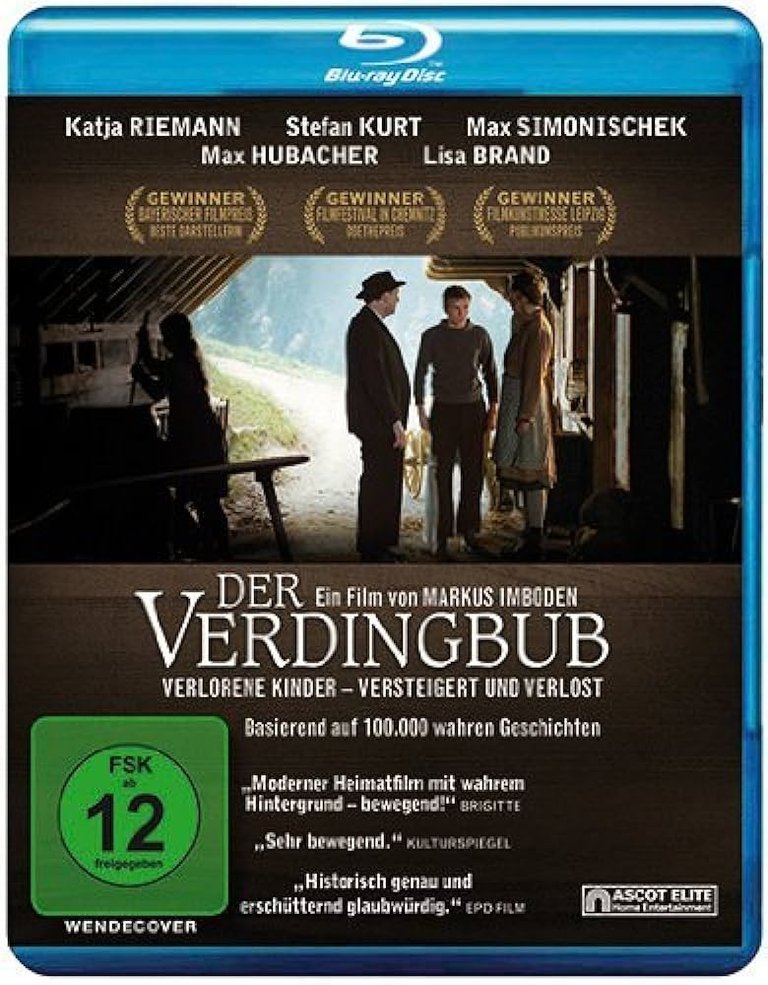The Foster Boy (2011): music as hope and escape | la música como esperanza y evasión
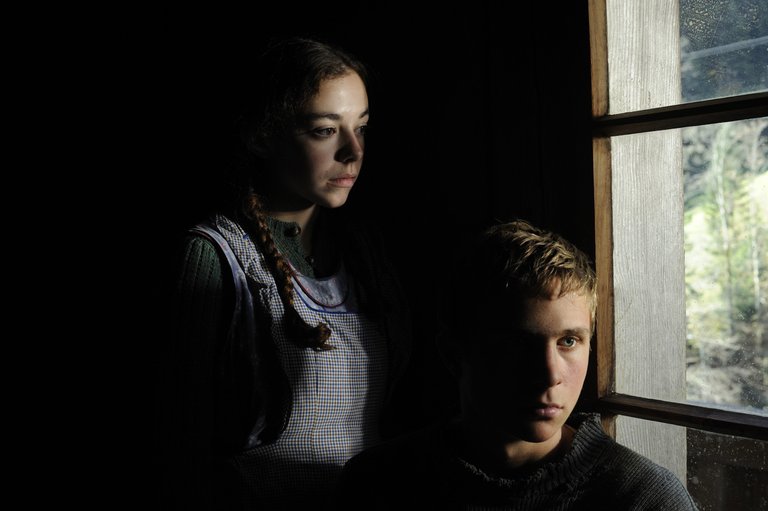
Within the enormous and growing mountain of films that I have seen in my entire life, I don't remember having seen another Swiss film before this one. I have seen films from different countries and from such strange origins as Lithuania, Georgia and Macedonia, but even though Switzerland is a more known country on this side of the world, I had not seen any film from that country, perhaps it's because it's not usually frequently stand out in the seventh art, I don't know.
Dentro de la enorme y creciente montaña de películas que he visto en toda mi vida no recuerdo haber visto otra película suiza antes de esta. He visto películas de diferentes países y de orígenes tan extraños como Lituania, Georgia y Macedonia, pero a pesar de que Suiza es un país más conocido de este lado del mundo, no había visto ningún film proveniente de ese país, quizás es que no suele destacar con frecuencia en el séptimo arte, no lo sé.
Der Verdingbub (The Foster Boy) is a dramatic film directed by Markus Imboden and written by Plinio Bachmann that is based on real events. The characters, as such, did not exist, but the context in which the story was set did occur and many children lived similar fates to those of the film's protagonists. It tells the life of Max, an orphan boy who lives with others like him in a foster home, an orphanage, until he's sent to the Bösiger farm to work, an older couple whose only child is in the war. Said like this, one might think that luck is smiling on the boy and one could understand that an older couple offers him shelter and food in exchange for some help on the farm, but that is not the case because from the first moment something does not give us a good feeling in that house. And the fact is that the couple, now converted into surrogate parents, use Max as cheap labor on the farm, entrusting him with heavy work day after day and although he has a room to himself (a dream for someone who slept next to twenty children in the orphanage), they feed him (a poor diet to say the least) and allow him to attend classes at the village school, they don't show him the slightest sign of affection; the Bösigers are unsociable and very harsh and constantly reprimand him and even resent the fact that, at night, after working all day, the boy starts playing the accordion, the only thing that is entirely his and that he inherited from his deceased mother.
Der Verdingbub (The Foster Boy) es una película dramática dirigida por Markus Imboden y escrita por Plinio Bachmann que está basada en hechos reales. Los personajes, como tal, no existieron, pero el contexto en el que se emarcar la historia sí ocurrió y muchos niños vivieron destinos similares al de los protagonistas de la cinta. En ella se cuenta la vida de Max, un niño huérfano que vive junto a otros como él en una casa de acogida, un orfanato, hasta que es enviado a la granja de los Bösiger a trabajar, un matrimonio ya mayor cuyo único hijo se encuentra en la guerra. Dicho así uno podría pensar que la suerte le sonríe al chico y podría entender que una pareja mayor le ofrezca techo y comida a cambio de algo de ayuda en la granja, pero no es así porque desde el primer momento algo no nos da buena espina en esa casa. Y es que los esposos, convertidos ahora en padres sustitutos, utilizan a Max como mano de obra barata en la granja encomendándole trabajos pesados un día tras otro y aunque tiene una habitación para él sólo (un sueño para alguien que dormía junto a veinte niños en el orfanato), lo alimentan (una alimentación cuando menos deficiente) y le permiten que asista a clases en la escuela de la villa, no le brindan la menor muestra de cariño; los Bösiger son huraños y muy duros y constantemente lo reprenden e incluso les molesta que, por las noches, después de trabajar durante todo el día, el niño se ponga a tocar el acordeón, la única cosa que es enteramente suya y que heredó de su madre fallecida.
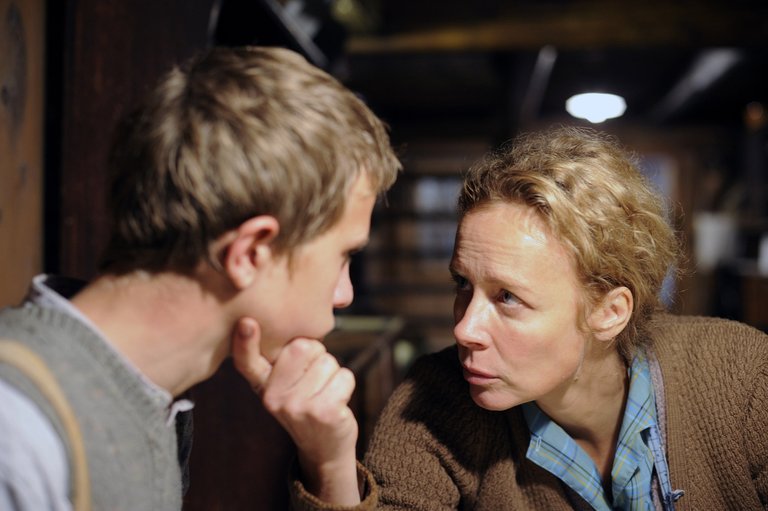
Max is a complex character, made from contrasting elements. On the one hand, he is strong despite his age and has a somewhat wild character. But he also has a sensitive side - after all, he's just a child - the one that makes him lose himself when he plays the accordion or that leads him to adopt a small rabbit as his pet. And this makes him more real and endearing.
Max es un personaje complejo, elaborado a partir de elementos que contrastan. Por un lado es fuerte a pesar de su edad y tiene un carácter algo salvaje. Pero tiene también un lado sensible - después de todo, es sólo un niño - ese que le hace perderse en sí mismo cuando toca el acordeón o que lo lleva a adoptar un pequeño conejo como su mascota. Y esto lo hace más real y entrañable.
Later, at the farm, Max will receive the company of Berteli, a girl who, although she's not an orphan, has also been taken to work with the Bösigers, because her mother cannot support her and her sisters. As expected, the elders are just as hard on the girl and while Max works in the field with the man, Berteli works cleaning the house, in the kitchen and other tasks. However, despite how bitter the children's fate may be, at least they are not alone and can go to school which would almost be a good life, but suddenly Jakob, the Bösigeres' son, arrives, and sometimes he turns out to be worse than his own father and will subject Max and Berteli to different humiliations. Then some other secondary characters also appear, among them the children's teacher who encourages Max to play the accordion at school and who tries to report the situation of abuse on the farm when she finds out about it, but realizes that the The case of the Bösingers is not an isolated case and that powerful people have an interest in continuing to supply cheap labor (that is what these poor children are) to the farmers. With such a sad fate and nothing to do to remedy it, Max dreams of escaping, but how? And where? One afternoon while listening to the radio at the teacher's house he hears music that moves him and makes him think of a paradise on the other side of the world where all things are made of silver: it's an argentinean tango.
Luego, en la granja, Max recibirá la compañía de Berteli, una niña que aunque no es huérfana también la han llevado a trabajar con los Bösiger, porque su madre no puede mantenerla a ella y a sus hermanas. Como era de esperarse, los ancianos son igual de duros con la niña y mientras Max trabaja en el campo con el señor, Berteli trabaja en la limpieza de la casa, en la cocina y otras tareas. Sin embargo, a pesar de lo amargo que puede ser el destino de los niños, al menos no están solos y pueden ir a la escuela lo que casi sería una buena vida, pero de pronto llega Jakob, el hijo de los Bösigeres, que a veces resulta peor que su propio padre y someterá a diferentes humillaciones a Max y a Berteli. Luego aparecen también algunos otros personajes secundarios, entre ellos la maestra de los niños que alienta a Max a tocar el acordeón en la escuela y que intenta denunciar la situación de abusos en la granja cuando se entera de ello, pero se da cuenta de que el caso de los Bösinger no es un caso aislado y de que poderosos personajes tienen interés en seguir suministrando mano de obra barata (eso es lo que son estos pobres niños) a los granjeros. Con un destino tan triste y sin nada que hacer para poder remediarlo, Max sueña con escapar, pero ¿cómo? ¿y a dónde? Una tarde oyendo la radio en la casa de la maestra escucha una música que lo conmueve y le hace pensar en un paraíso al otro lado del mundo en el que todas las cosas son de plata: un tango argentino.
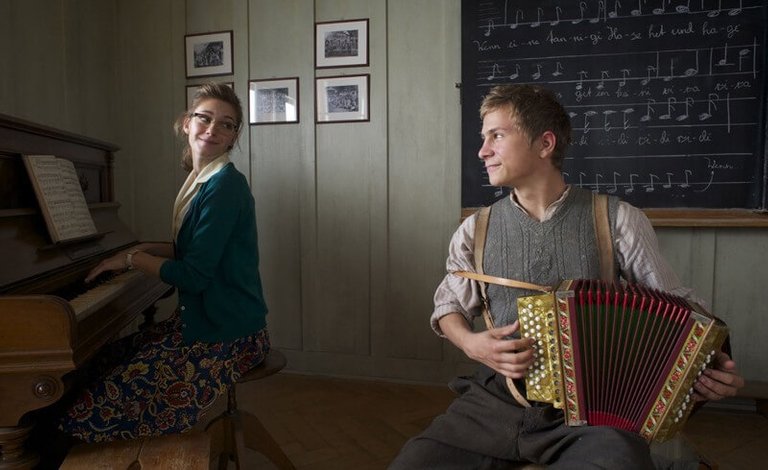
The Foster Boy is a sad story, obviously, with very hard scenes and situations that make us feel compassion for the characters, especially because they are children. It's true that there are many stories like this, but each one of them has particular elements that differentiate it and that strike us with the wish that hopefully no child will go through similar circumstances... although we know that today, millions of them suffer even worse fates. Sad but true.
The Foster Boy es una historia triste, obviamente, con escenas muy duras y situaciones que nos hacen sentir compasión por los personajes, sobre todo porque son niños. Es cierto que historias como esta hay muchas, pero cada una de ellas tiene elementos particulares que la diferencian y que nos golpean con el deseo de que ojalá ningún niño pase por circunstancias parecidas... aunque sabemos que hoy día, millones de ellos, sufren destinos aún peores. Triste pero cierto.
There were several things that caught my attention beyond the story. One of them was knowing that there was this stain on Switzerland's past (a country that for many of us here in Latin America is the ultimate fantasy of quality of life, human rights and development) and that the use of orphans (or children who were separated from their parents due to poverty, illness and other things) continued until the sixties of the last century. And the other thing that left me thinking was that this child dreamed of crossing the world to Argentina, the land of tango where he could play the accordion and lead a life away from those cruel bosses while millions of people on this side of the world dreamed of cross the Atlantic to Europe. Heaven for some is hell for others and obviously one builds it oneself based on one's experience, but regardless of where one lives or how old one is, as Milan Kundera says in one of his novels "The person who wants to leave The place where he lives is not happy" and it's in the pursuit of this happiness that we embark on different adventures. The Foster Boy is a film for those who like dramas, European cinema, those films set in the countryside or for those who are curious enough to see some Swiss cinema (not very common on movie theaters in this side of the world), have any of you seen this movie? I read you in the comments.
Hubo varias cosas que me llamaron la atención más allá de la historia. Una de ellas fue saber que existía esta mancha en el pasado de Suiza (un país que para muchos de nosotros acá en latinoamérica es la fantasía última de calidad de vida, derechos humanos y desarrollo) y que el uso de los huérfanos (o niños que eran separados de sus padres por temas de pobreza, enfermedad y otras cosas) se haya mantenido hasta los años sesenta del siglo pasado. Y lo otro que me dejó pensando fue que este niño soñaba con cruzar el mundo hasta argentina, la tierra del tango en donde podría tocar el acordeón y llevar una vida lejos de aquellos patrones tan crueles mientras millones de personas de este lado del mundo soñaban con cruzar el atlántico hacia Europa. El cielo de unos es el infierno para otros y evidentemente los edifica uno mismo en base a su experiencia, pero sin importar en dónde uno viva o qué edad tenga, tal como dice Milan Kundera en una de sus novelas "La persona que desea abandonar el lugar en donde vive no es feliz" y es en la búsqueda de esta felicidad que nos embarcamos en diferentes aventuras. The Foster Boy es una película para quienes gustan de los dramas, del cine europeo, de esas películas ambientadas en el campo o para quienes tengan la curiosida de ver algo de cine suizo (no muy común en las carteleras de este lado del mundo), ¿alguno de ustedes ha visto esta película? Los leo en los comentarios.
Reseñado por @cristiancaicedo
Other posts that may interest you | Otros posts que pueden interesarte:
  |
|---|
